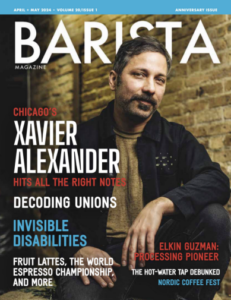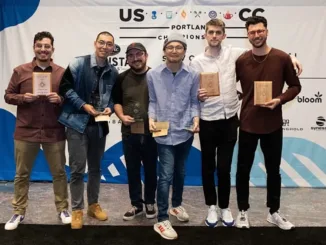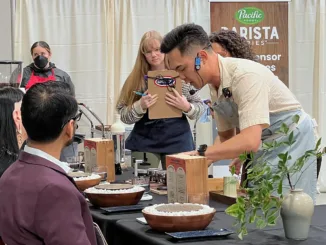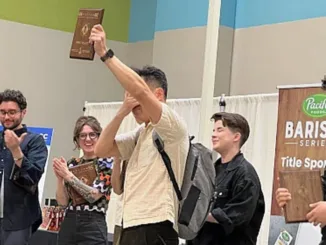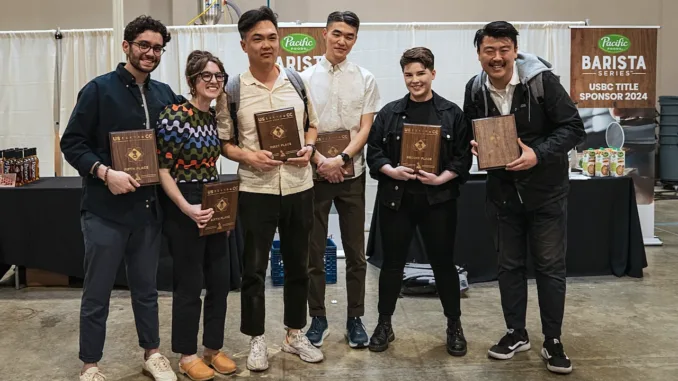
In his second year competing again after a nine-year hiatus, the Los Angeles-based barista became the 2024 U.S. Barista Champion.
BY CHRIS RYAN
BARISTA MAGAZINE ONLINE
Featured photo courtesy of Pacific Barista Series
When the 2023 United States Barista Championship (USBC) in Portland, Ore., came to a close last April, Frank La thought his time as a coffee competitor had ended with it.
The barista, who owns Los Angeles’ Be Bright Coffee with his wife, Michelle, had competed in 2013 and 2014, then took a nine-year break. This 2023 USBC had been his return to the stage, and it was successful: He earned a spot in the finals and ultimately placed sixth.
But despite the success, Frank thought that marked the end of his competition path. “Running the business and trying to prepare for competition was just so much effort and energy, and I had made up my mind that I was done,” Frank says. “And then on my flight back from Portland to L.A., Michelle was like, ‘I really feel like you should do it one more time. You’re so close.’”
That pep talk led Frank to take one more effort at competition, and it was a triumphant one: Last month in Rancho Cucamonga, Calif., Frank topped the field to become the 2024 United States Barista Champion.
In the first installment of this two-part article, we talk to Frank about finding his 2024 USBC coffee, returning to competition, and surrounding himself with a great team.
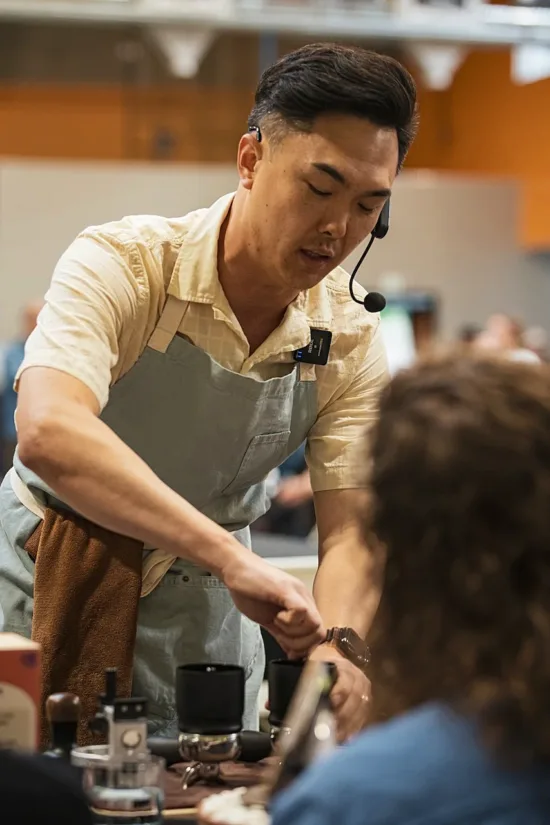
Firstly, what was your competition coffee, and why did you choose it?
It’s called Ombligon because it’s Spanish for “belly button,” which is ombligo. They say there’s a little nub on the cherry that looks like a belly button, so that became the name of the variety. My first introduction to it was Jack Simpson from Australia; he placed third at the 2023 World Barista Championship and that’s the variety he used.
I’ve seen varying sources on what kind of mutation it is, but I called out that it was an Ethiopian landrace variety mutation. It was apparently found in a research center in Colombia, and some producers took a chance on it, including Nestor Lasso at Finca El Diviso—he has an export company called Lohas Beans, and this is his highest-scoring coffee.
I was able to get my hands on this coffee through my friend Juan Diaz, who has a company called Knowhere Coffee. It’s anaerobically fermented, processed as a natural, but it’s also thermal shock, meaning they do these shocks with different temperatures of water going from hot to cold—hot to open up its pores during fermentation, and then cold to stop fermentation. And then they also introduce Saccharomyces yeast, which is like a baker’s yeast, during fermentation.
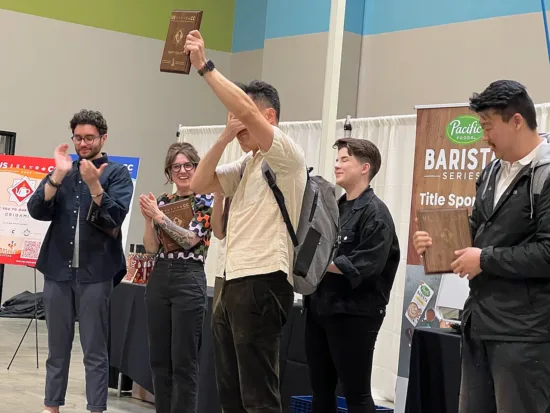
Can you talk about what it was like to return to competition, and how you approached your final run?
Last year when I placed top six, I had taken a nine-year hiatus. I had to relearn a lot of the rules for competing before 2023, like what the judges are looking for, what all the cool kids are doing, the different processing … when I last competed, we had three processing methods: washed, honey, and natural. Nobody was competing with Geshas. So the fact that I got top six in 2023, I was pretty stoked about that.
As I was thinking about this year, I wanted to do a routine that really resonated with me, and where I wouldn’t be pretending to be something that I wasn’t. I don’t work with producers on a one-on-one, intimate level; I’m not innovative in the sense that I’m coming up with industry-changing techniques to serve things. But one thing I do know is that I commit myself to this craft. I commit myself to what I love.
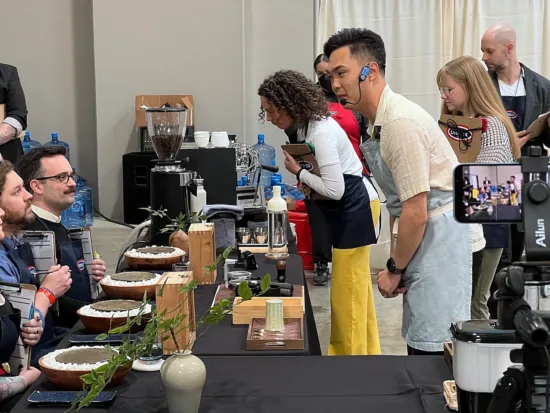
With that approach, how did you decide on the theme of kodawari that informed your routine?
I was scrolling on Instagram one day and I watched this video from an account called Melo Drip. He had talked about kodawari in relation to a coffee service in Japan, and that they pursue this level of perfection when they craft coffee. The quote that got me was: “With kodawari, perfection is aspirational rather than attainable. It’s found in the journey itself.”
I loved the idea that when one embarks on this journey to pursue perfection, they know from the beginning that they will never achieve it. And yet they commit to it and pursue it with all they have. And I felt like we can see that throughout the coffee chain, whether you’re a producer or a roaster or even a barista. There’s a reason why we stay in this industry for so long: It’s ever-evolving and we’re continually pushing. That really resonated with me, and I felt like there was a lot I could draw out to create a compelling routine.
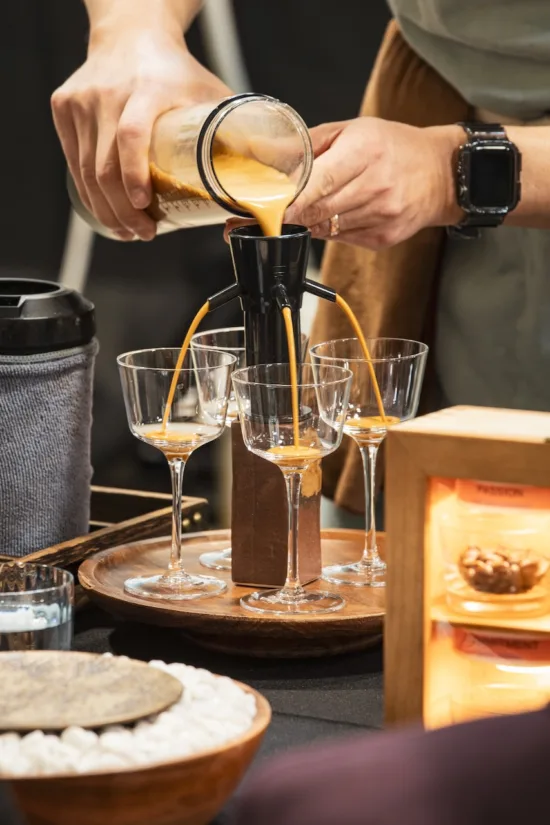
I know you had a big team around you, from your coach Jaymie Lao, to a lot of industry folks giving you feedback. Can you tell me more about that support system and how it helped you?
Jaymie is someone I’ve long admired. I never got to work with her, but she’s a coffee legend in L.A., in the sense that she’s been involved with a lot of amazing companies. She was part of Intelligentsia Venice, and then she was the director of operations for Go Get Em Tiger. But she also has judging experience on the sensory side, and she was one of the support team members for Charles Babinski when he won the USBC (in 2015). So I felt like she would be a huge asset because she knows what it takes to prepare and to win the nationals.
She graciously agreed to work with me, and what she brought was her network of coffee friends who were willing and excited to lend us their ears, their hearts, and their palates. I had the pleasure of having four USBC champs sit in. Two of them were virtual—Isaiah Sheese and Charles did a virtual sit-in—and I had Michael Phillips and Bronwen Serna come in. We also had a few past competitors who had done well—just a lot of great folks who gave me a lot of feedback. We made adjustments right up until the Monday prior to competition.
Also, I had my wife in my corner as my script supervisor, and we worked on the script endlessly. Michelle is an actress, and so she gave me a lot of feedback on how to say certain words. I’d be like, “I can’t say it like that!” But what ended up coming out was just a culmination of our team coming together and working so well.
For part two of this story, where Frank discusses representation, approaching the World Barista Championship, and more, click here.
Subscribe and More!
Out now: It’s the April + May 2024 issue of Barista Magazine! Read it for free with our digital edition. And for more than three years’ worth of issues, visit our digital edition archives here.
You can order a hard copy of the magazine through our online store here, or start a subscription for one year or two.

